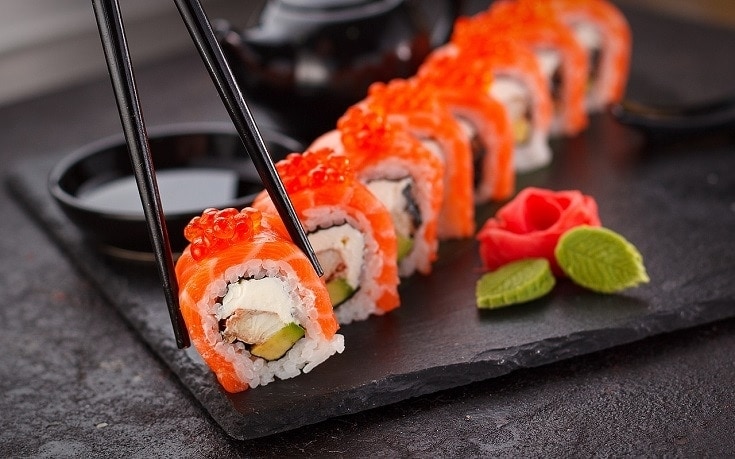Can Dogs Eat Sushi? Vet Approved Facts & Safety Guide
Updated on

You’ve just brought home some fresh Nigiri and are wondering if you can share some with your pup when you realize you have no idea if it’s safe to feed sushi to a dog. After all, the last thing you want to do is end up making your dog sick while you’re trying to treat them to something special.
Whether sushi is safe for dogs isn’t a simple one to answer. After all, there are many types of sushi. However, the short answer is still no, you should not be giving your dog sushi as it contains raw fish.
To find out why this is the case and why you should never give a dog raw fish, read on. The guide below will fill you in on everything you need to know.
Is Sushi Safe for Dogs?
This is a complex question since sushi isn’t a type of food but rather a broad grouping of many dishes. Broadly speaking, sushi is a raw fish wrapped in rice and seaweed. However, since raw fish is the main ingredient, sushi is not a treat you should be giving to your pooch.
To best explain our answer to the question, we should break sushi into its separate components and inspect each individually. Fish is the main ingredient that people think of when they think of sushi, and it’s also the most complex part of the equation. The rice is usually short-grain rice made with rice vinegar, salt, and sugar.
Rice is perfectly fine for dogs to eat and is commonly found in dog food. While not toxic, your dog’s intake of sugar and salt should be limited, but sushi is unlikely to contain a significant amount of either of these ingredients. Soy sauce is sometimes present, and it includes a lot of salt.
Some sushi may also contain garlic, which is toxic for dogs, depending on the amount. Vinegar is also known to cause digestive problems in some dogs, so while it’s unlikely to cause a significant illness, it won’t make them happy, either. The seaweed, called “nori,” when served plain, unseasoned, and in small amounts, should be perfectly safe and is relatively nutritious.

Are Any Types of Fish in Sushi Safe to Feed My Dog?
Unfortunately not. When dealing with raw fish, the most significant concerns are bacteria and parasites. Salmonella, Clostridium, and Listeria can be present in raw fish meat and lead to serious health issues in dogs and people alike. Many fish also have parasites—like flukes, roundworms, and tapeworms—inside them, which can infect your dog if they eat them.
Most of these parasites are fish-specific and unlikely to cause significant illness in other species but may lead to an upset stomach. Sadly, it’s a simple fact that all raw fish is risky for dogs, including the fish found in sushi. You’re much better off giving your dog cooked fish or distracting them and telling them “no” when they start begging. In terms of cooked fish, the best options for your dog include:
- Cod
- Salmon
- Whiting
- Herring
- Whitefish
- Flounder
- Catfish
Farm-raised fish may contain harmful antibiotic residues or other additives and should be avoided.

A Special Note About Salmon and Tuna
While bacterial meat contamination is usually the biggest concern when feeding a dog raw fish, salmon and tuna have other issues worth mentioning. Another serious illness in dogs that comes from eating raw or undercooked salmon, trout, steelhead, or Pacific Giant Salamanders is called ‘Salmon disease.’
It’s caused by a bacteria called Neorickettsia helminthoeca present in the flatworm Nanophyetus salmincola that infests these types of fish. The condition is life-threatening, requiring urgent veterinary treatment. The bacteria are especially common in fish found in the Pacific Northwest, where most salmon comes from.
Some types of fish, like albacore tuna, tilefish, and swordfish, should be avoided even when thermally processed due to high mercury content that can lead to signs of poisoning in dogs. Tuna is notorious for being full of mercury. If your dog consumes too much mercury, they could suffer from chronic mercury poisoning, as it builds up in the dog’s tissues, which leads to neurological signs and kidney damage.

Other Ingredients to Watch Out For
While rice, fish, and seaweed are the basic components of sushi, sometimes you’ll also find other ingredients inside. These include spices like ginger, which should be safe for your dog in small doses. Other common flavor additives include condiments like wasabi, which you shouldn’t give to your dog.
Another concern is avocado, which contains something called “persin,” which is fatally toxic to a wide variety of animals. Dogs tolerate it better than many other animals, but it can still cause vomiting and diarrhea, so avoid giving your dog avocados.

One More Thing to Worry About
Besides parasites, bacteria, and mercury, there’s one more thing found in certain types of raw fish sushi meat that could potentially harm your dog: thiaminase.
Thiaminase is an enzyme that breaks down thiamine molecules, making them ‘useless’ or biologically inactive from a nutritional perspective. That’s a big problem because dogs need thiamine to live and have a normal carbohydrate metabolism and neurological function. Cooking tends to break down thiaminase, making it less likely to be dangerous to your pup.
Is There Any Benefit to Serving Your Dog Raw Fish?
No! It poses a significant health risk for your pup, as already discussed. Cooking the fish well and removing the head, scales, skin, and bones allow them to enjoy it as a delicious treat. Cooked fish has many health benefits for pups: it’s full of lean protein, packed with omega fatty acids, and many dogs love the taste.
Cooked fish doesn’t come with any of the risks that raw fish does (assuming it’s prepared properly, of course). With all of that in mind, there’s really no reason ever to give your dog raw fish. It will subject them to life-threatening pathogens, and it’s also not healthier or tastier for them. We recommend adding fish to your dog’s diet or using it as a special treat, but be sure to cook it well first.
So, What’s the Verdict?
Sushi contains raw fish and additives such as soy sauce, salt, garlic, and sometimes avocado, all of which carry different health risks for your dog. Raw fish can contain parasites, bacteria, heavy metals such as mercury, and enzymes that have an adverse effect on the dog’s health, so you’re rolling the dice every time that you share your sashimi.
In our opinion, it’s not worth the risk, so give your dog cooked fish instead, or tell them “No” when they start begging or offer an alternative safe treat or a distraction.
We know it’s difficult to turn down your pet when they hit you with those puppy dog eyes, but it’s even harder to explain why you’re rushing them to the vet because raw fish carries real risks for your dog. There are several other safe alternatives you can give them instead.
Related Reads:
Featured Image Credit: DrawsAndCooks, Pixabay













